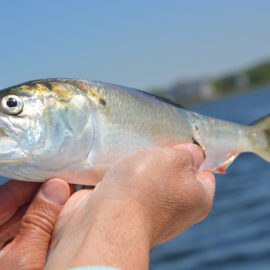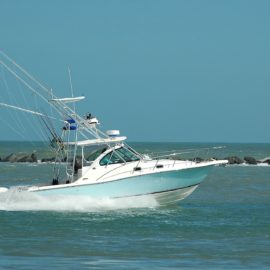
The state house advanced the pogie limit bill and the industry is not in a good mood.
A bill that would put the first substantial limits on Louisiana’s biggest but least-regulated commercial fishery cleared the state House of Representatives this week but could face fierce opposition in the Senate. House Bill 1033 would would cap the menhaden catch in Louisiana waters at 573 million pounds per year and require menhaden fishing vessels to report daily locations and catch amounts to the state. The menhaden industry has avoided regulation in Louisiana while other Gulf of Mexico states have tightened rules, enacting catch limits and fishing exclusion zones to protect the many species that depend on the pencil-length fish for food. The measure passed by a wide margin – 75 to 22 – on Wednesday but the industry has more allies in the Senate, said the bill’s sponsor, Rep. Joseph Orgeron, a Republican from Larose. Last year, another bill aimed at limiting the menhaden industry passed the House but died amid negotiations in a House-Senate conference committee. A Senate vote on the bill has yet to be scheduled. “As I’ve always said, ‘small fish, big debate,’” Orgeron said.
nola.com

Smithsonian Environmental Research Center
The menhaden are not in trouble but many that feed off them are.
Menhaden, also called pogies and bunker, serve as a key food source for birds, whales and fish popular with anglers. Fast-breeding menhaden are not considered at-risk, but many menhaden eaters, like speckled trout and dolphins, have suffered population declines in recent decades. Caught by the millions off the Louisiana coast each year, menhaden are processed into fertilizer, animal feed and health supplements. More pounds of menhaden are netted each year in the state’s waters than the combined hauls of the state’s better-known fisheries, including shrimp, crab, oysters and crawfish. This year’s bill was backed by conservation and recreational fishing groups but opposed by the menhaden industry and some of the communities depend on it for jobs and tax dollars. South African company Daybrook Fisheries indicated the bill’s catch limits may force it to shut down its menhaden processing plant in south Plaquemines Parish, potentially putting 300 people out of work. The other menhaden processing plant in Louisiana is south of Abbeville. Owned by Omega Protein of Canada, the plant employs nearly 280 people and pays about $1 million in local taxes each year, said Rep. Ryan Bourriaque, R-Abbeville.

Courtesy of Healthy Gulf
One argument is that just because all other gulf states have limits we in Louisiana should. I wonder about that one!
Rep. Beryl Amedée, R-Houma, rejected the idea that Louisiana fishery rules should follow the lead of other states. Texas has menhaden catch limits and near-coast exclusion zones, Alabama and Mississippi have exclusion zones, and Florida prohibits all large-net fishing in its waters. East Coast states also have menhaden catch limits and other restrictions. “The restrictions in other states are not necessary in Louisiana because our coast is different; we have a working coast,” Amedée said. Being different, in this case, is nothing to be proud of, said Rep. Scott McKnight, R-Baton Rouge. “We constantly talk about how (Louisiana) is last,” he said, referring to the state’s frequent poor performance in national education, health care and other rankings. “Well, here we are again the last state, this time in protecting our natural resources.”
Maybe we have been last is so many ways that we need to make sure we are last in all ways. Come now guys, there has to be a better way that will help the state move up in rankings.



